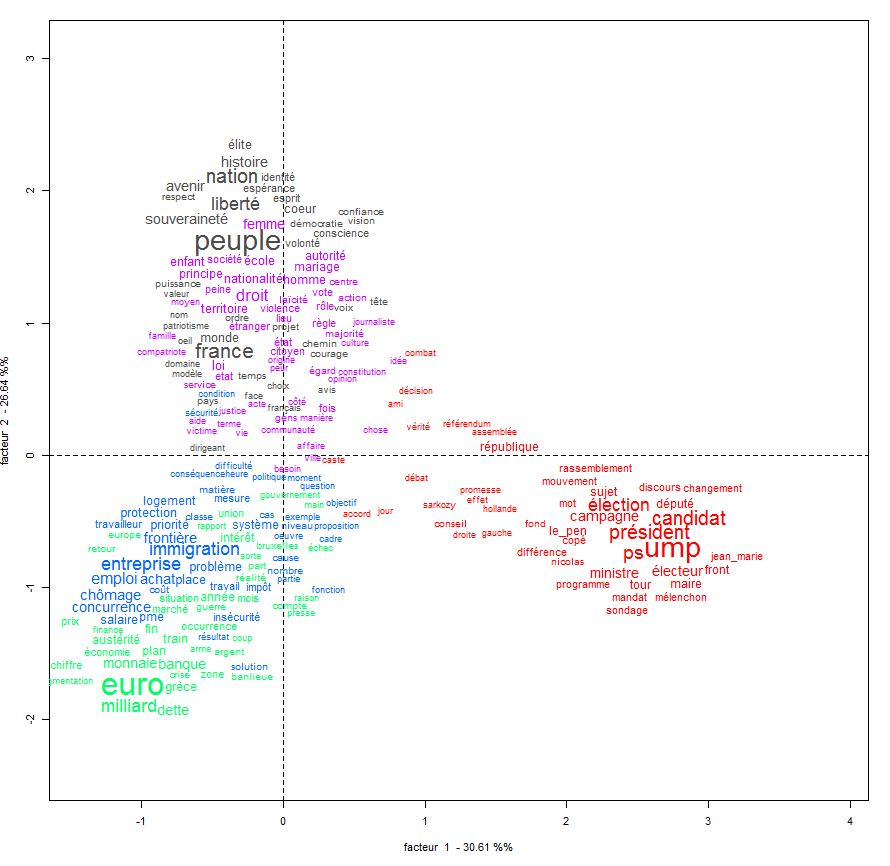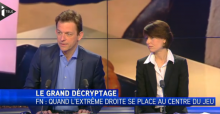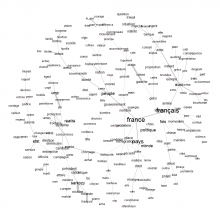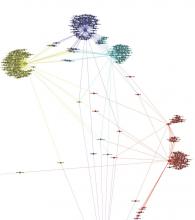TV-panel: Is the National Front at the Center of France's political game?
In this video on itélé, Journalists Renaud Dély (Nouvel Obs), Guillaume Roquette (Le Figaro Magazine), opinion-poll specialist Frédéric Dabi (Ipsos), and Cécile Alduy discuss how central, or not, is the National Front on the eve of the March 22 and 29 local elections in France, where the far right party is predicted to win up to 30% of the votes.
Mediapolis: What Words To Use To Counter The National Front?
Former Political Science and constitutional law Professor Olivier Duhamel is also a radio host on "Mediapolis," a weekly hour-long show that deciphers the way media and politics intermingle.
Le Double Discours de Marine Le Pen: Themes, Words, Meaning
Les Inrocks, « Marine Le Pen continue de pratiquer le double discours » (Interview published on 18.02.2015)
Quelles sont les principales différences entre le discours de Marine Le Pen et celui tenu par son père ?
TV Interview with Laurent Neuman on BFM.Tv
On February 27, the book was highlighted in a prime time news program on BFM.tv in an interview with journalist Laurent Neuman.
BFM-TV 02/27/2015 : L’invité de 19h
Radio Interview: « La Grande Table », France Culture, L’Invitée
"La Trompeuse banalisation du Front National", a radio debate between Cécile Alduy and Raphaël Liogier, Professor at the Institute of Political Studies of Air-en-Provence and at the International College of Philosophy in Paris, in « La Grande Table », France Culture, L’Invitée (03/03/2015).
Conference and Debate at the Jean Jaurès Foundation
On March 2, Cécile Alduy was the guest of the "Cité du Livre", a debate and Q/A organized by the Fondation Jean Jaurès in Paris, to discuss her methodology and findings with Jean-Marie Pottier, journalist at Slate.fr, Sylvain Crépon, Professor of sociology at the University of Tours and a member of the Observatoires des radicalités politiques, and the audience.
The video is available here.
The Rhetoric of Allusion (Excerpt from the Book)
The book has been excerpted on the news website Atlantico (02-14-2015): "Comment le discours populiste rassembleur de Marine Le Pen a dilué la xénophobie explicite du Front national"
An Interview in Libération
How political battles are battles about the meaning of words:
INTERVIEW published in Libération, 02/10/2015:
Sunday Feb 8, in a local election in Eastern France, the socialist candidate won by only 863 votes against his opponant form the National Front. According to a witness quoted by Libération, the FN candidate,
Tri-grams by author and genre
One of the methods we employed to study the differences between Marine Le Pen's and Jean-Marie Le Pen's rhetoric was n-grams. Briefly, n-grams are N co-occuring words in a corpus. If N = 2, we call them bi-grams; three words are tri-grams, and so on. More information about ngrams is available on this What are N-Grams? page from "Text Mining & Analytics 101."
Bibliographies
Here is a list of bibliographies on topics related to the rhetorical analysis of political discourses.
Violence in the National Front's Rhetoric: A Political and Historical Perspective
On January 16, Roadsmag published an in-depth analysis of the role and faces of violence in the National Front's discourse. Rapahël Enault conducted a series of interviews with Nicolas Lebourg, a historian of the National Front and far right movements in France, and Cécile Alduy, to understands the roots and manifestation of violence in Jean-Marie and Marine Le Pen's discourse.
Mythologies: A Bibliography
Barthes, Roland, Mythologies, Paris, Seuil, 1957.
Deloye, Yves, Commémorations et imaginaire national en France (1896-1996) in Pierre Birnbaum, Sociologie des nationalismes, Paris, Presses universitaires de France, 1997.
Domenach, Jean-Marie, La propagande politique, Presses Universitaires de France, 1973.
Durand, Gilbert, Introduction à la mythodologie. Mythes et sociétés, Paris, Albin Michel, 1996.
Eliade, Mircea, Aspects du mythe, Paris, Gallimard, 1963.
Semiotics, Rhetoric, and Political Discourse: A Bibliography
Alduy, Cécile, « Mythologies et rhétorique du Front National: Petit essai de sémiologie historique », dans Le Front National : un parti en transition ?, sous la direction de Sylvain Crépon, Nonna Mayer et Alexandre Dézé, Presses de Sciences Po, à paraître 2015.
Amossy, Ruth et Jean-Michel Adam, Images de soi dans le discours : La Construction de l’ethos, Lausanne, Delachaux et Niestlé, 1999.






